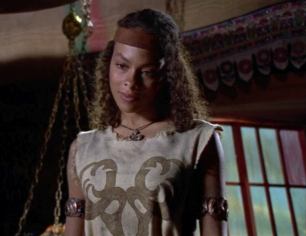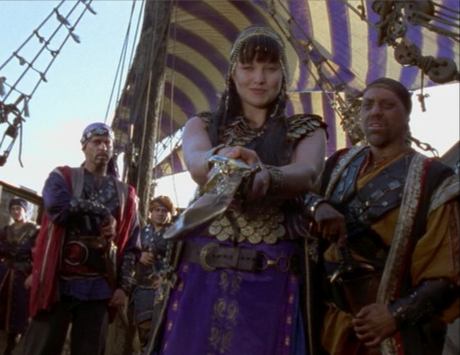The story's flashback is based on an episode in Julius Caesar's life as a young man: he was kidnapped by pirates and held for ransom. As a noble, he would fetch a high price, but as an ambitious and boastful noble, he told the pirates he'd be worth an even higher price than they're asking for. Caesar charmed the men who held him captive, to the point where he felt comfortable ordering them around as servants. He'd boast about coming back after his release and having them all crucified. The pirates found his boasts entertaining, confident they'd elude any attempt at capture, and that young Caesar could not find his way back to their lair. After his release, he did exactly that, and this story was an early indication of the supreme confidence of a man who eventually became Rome's first emperor. Destiny introduces Caesar with this anecdote, casting Xena as the pirate who holds him hostage; she falls in love with him, but he keeps his word to have her crucified, helping to give birth to a dark vengeance that would have her on his trail to the end of his life (and throughout much of the series). Whenever any kind of myth or historical tale is used on this show, it's always useful to see how it was adapted to fit the show's mythos. Where exactly did this story come from, and how was it altered? In the dvd commentary, Rob Tapert tells us that Colleen McCullough's First Man in Rome was "kinda the inspiration." Prof. Weisbrot01 tells us that apparently McCullough's book, Caesar's Women was the inspiration (he actually calls it "First Woman," perhaps confusing the first book of the Masters of Rome series with the last to date). They're both wrong: First Man in Rome was Colleen McCullough's first book in the series, in which Julius Caesar doesn't appear, while Caesar's Women was the last, at the time Weisbrot's book was written. Up until the publication of Caesar's Women, just several months before Destiny was filmed, Fortune's Favorites was the latest published book in McCullough's Masters of Rome series, and it's this book that dramatizes Caesar's kidnapping by pirates. If we track the changes in the story, from Seutonius to Plutarch to McCullough to Tapert, we find some interesting things. For one thing, none of the accounts places the action anywhere near Thrace. In the ancient sources, Julius Caesar is in the southern Aegean sailing to Rhodes when he's intercepted off the southeastern coast of modern-day Turkey by Cilician pirates (a reference we'll hear in season three's Forgiven) and taken to one of its thousands of small coves, which are indistinguishable from each other. The pirates are described as the "most murderous of men," but in awe of the confident nobility of young Caesar; we don't learn much more about them. We see our first hint of a connection to Xena in McCullough's book, though: there, we're introduced to the pirate leader, who's described in very curious terms: "A tall, youngish man clad in a Tyrian purple tunic heavily embroidered with gold pushed his way between the milling hordes on the deck and mounted the plank steps to the poop. He was not armed, nor did he look at all martial...The pirate chieftain's light green eyes narrowed; he put a manicured hand up to his carefully curled yellow hair. 'You're very collected, Senator,' the pirate said, his Greek indicating that perhaps he came from one of the isles of the Sporades." His name is Polygonus, "many angles," and his crew is described thusly: "Like their chief, the rest of the pirates were dandies; some sported wigs, some used hot tongs to produce rolling curls in their long locks, some were painted like whores, some preferred exquisitely close shaves and the masculine look, and all were very well dressed." Julius Caesar is very Apollonian to these Dionysian pirates; they're used to having their way, so they decide to let Julius have his, because it entertains them to do so. At one point, Polygonus is almost Bacchus-like: " 'You're an odd fish, Caesar, to save your passion for your work.' He patted his belly and sniffed appreciatively at the contents of his rock-crystal goblet. 'For myself, the only thing I like about piracy is the delightful life it brings me when I'm not sailing at sea. But most of all, I love good wine!' " McCullough's pirate chieftain is a dandy with fine hair and clothes, like the Stranger from The Bacchae, and dressed in purple, enjoying his wine, like Dionysus, and that's no accident. Caesar's youthful exploits among the pirates has a corollary in myth: from Homer's Hymn to Dionysus:
 We now can guess why Destiny opens in Thrace, and why Xena went from village defender to vengeful warlord to the otherwise unlikely career choice of pirate. Both Xena and Caesar are established as Dionsyiac forces, but even evil Xena represents an element of the good Dionysiac force of freedom; she may be on the high seas raising funds, but she's also searching the horizon, whereas Caesar is utterly single-minded: there's no doubt in his mind where he's going, and what other people are worth to him, and he to them, down to the last dinar. The setting of Orpheus and Eurydice's homeland as the place where evil Xena is born and good Xena dies makes sense as well: it's a story of death and rebirth that will repeat itself many times. Destiny contains many elements that will be repeated: the pirate motif we'll see many times, including Ulysses and Lost Mariner at the end of this season. The appearance of Caesar03 inaugurates a series-long arc, in both Xena and Hercules, most episodes of which will have Dionysiac overtones (A Good Day in season four is the only one that doesn't have any, as far as I can tell). In addition to Dionysus and The Cyclops, the other association with Euripides in this episode is the reference to Medea. In Rob Tapert's previous (and first) outing as director, on the Hercules episode, Once a Hero, he features an older Jason, bereft of his former glory earned from taking the Golden Fleece, and never the same after Medea killed his children. According to Tapert, he had long wanted to do a story about Xena mentoring Medea, only to realize she mentored the wrong person, bearing responsibility for Medea's crime as a result. He never did, but we can see how part of that story was used in Destiny. M'Lila, the slave girl on board Xena's ship who teaches her the pinch, and wears the ram image that will inspire Xena's armor, is like a mentor to the young warrior princess. In a sense, she's training the wrong person, because Xena will use these skills for evil at first, but M'Lila sees beneath Xena's character flaws to the nobility underneath, and, as Theseus gave Hercules a new mission in life after his moral downfall, so M'Lila gives Xena a reason to live as she lays dying.  |
